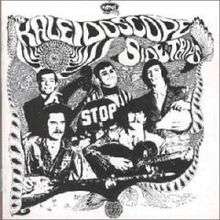Side Trips
Side Trips is the 1967 debut studio album by American band Kaleidoscope. It was released in June 1967, on Epic Records BN 26304, and re-released on vinyl by Sundazed Records (2007). The album has a raw, non-limited instrumental mentality, for each member played many instruments; for example, David Lindley played guitar, banjo, fiddle, and mandolin, and Solomon Feldthouse played saz, bouzouki, dobro, vina, oud, doumbek, dulcimer, fiddle, guitar, and vocals.
| Side Trips | ||||
|---|---|---|---|---|
 | ||||
| Studio album by The Kaleidoscope | ||||
| Released | June 1967 | |||
| Recorded | 1966–1967 | |||
| Genre | Psychedelic folk, jug band, Arabic | |||
| Length | 26:13 | |||
| Label | Epic | |||
| Producer | Barry Friedman | |||
| The Kaleidoscope chronology | ||||
| ||||
Background
After forming in 1966, the group known then as The Kaleidoscope, won a recording contract with Epic Records. They first recorded a single "Please" backed by a non-album track "Elevator Man", that was released in December 1966. The album Side Trips was released in June 1967, and an additional single was released with album cut "Why Try" backed by non-album track "Little Orphan Nannie". The album combined rock & roll with roots and world music, and contained several traditional songs including Charlie Poole's "Hesitation Blues" and Cab Calloway's signature song "Minnie the Moocher". Among other cuts, bassist Chris Darrow contributed a couple of trippy songs, "If the Night" and "Keep Your Mind Open", while Solomon Feldthouse contributed an Eastern influenced "Egyptian Gardens". Soon after the release, they re-named themselves as simply Kaleidoscope.
Reception
| Review scores | |
|---|---|
| Source | Rating |
| Allmusic | |
Allmusic's retrospective review praised nearly all of the individual songs and called the album "arguably the most diverse effort of 1967", but concluded that enthusiasts and collectors would be better off getting the more comprehensive Pulsating Dreams anthology, which includes the entirety of Side Trips.[1]
Track listing
- "Egyptian Gardens" (Solomon Feldthouse) – 3:08
- "If the Night" (Chris Darrow) – 1:51
- "Hesitation Blues" (Charlie Poole) – 2:27
- "Please" (Feldthouse, Mark Freedman) – 3:18
- "Keep Your Mind Open" (Darrow) – 1:56
- "Pulsating Dream" (Darrow, Feldthouse, David Lindley) – 2:16
- "Oh Death" (Dock Boggs) – 3:25
- "Come on In" (Traditional, arranged by David Lindley) – 2:07
- "Why Try" (Lindley) – 3:39
- "Minnie the Moocher" (Cab Calloway, Clarence Gaskill, Irving Mills) – 2:15
Personnel
Musicians
- David Perry Lindley – banjo, fiddle, mandolin, guitar, harp guitar, 7-string banjo
- David Solomon Feldthouse – saz, bouzouki, resonator guitar, veena, goblet drum, dulcimer, fiddle, twelve-string guitar
- Chris Darrow – bass, banjo, mandolin, fiddle, autoharp, harmonica, clarinet
- Fenrus Epp – violin, viola, bass, piano, organ, harmonica
- John Vidican – percussion
Technical
- Barry Friedman – producer
- Mike Goldberg – production supervisor
- Arnold Shaw – liner notes
References
External links
- Side Trips at Discogs (list of releases)